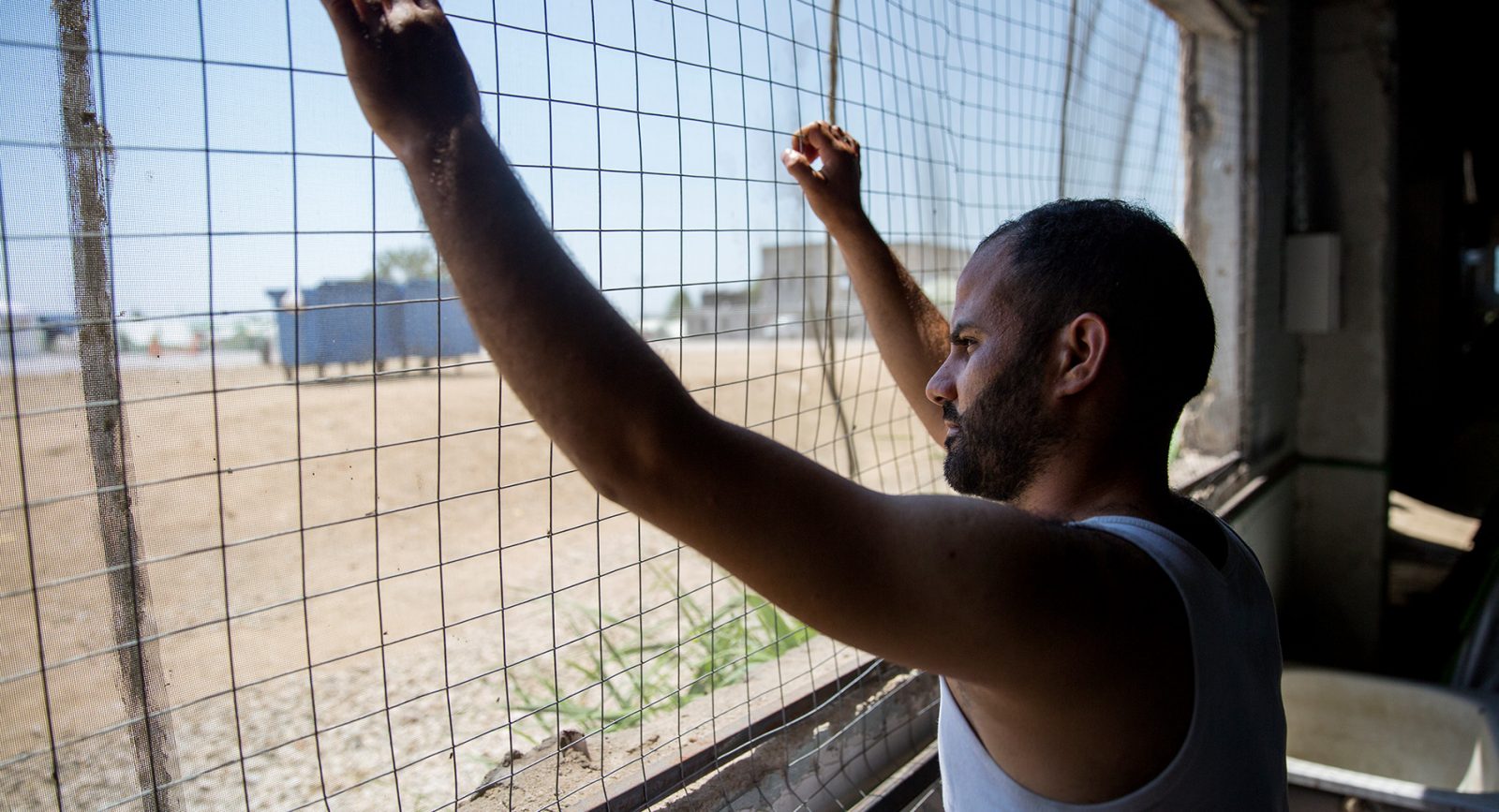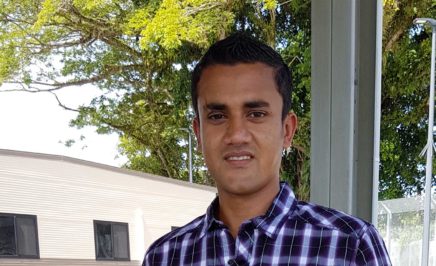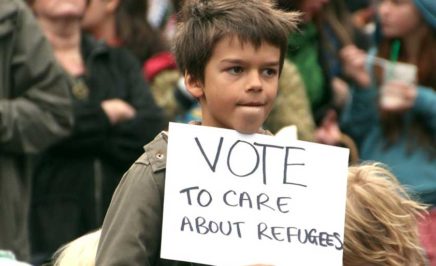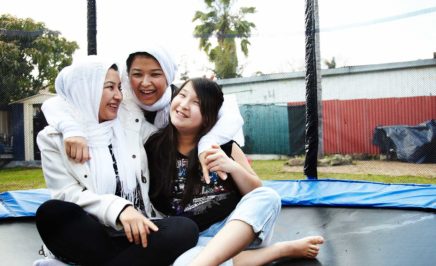Alex Pagilaro, Refugee Campaign Coordinator for Amnesty International, helps to ensure the rights of people seeking asylum are protected in Australia. Here are her experiences of time in Australia’s detention centres.
Friday 27 January, 2012
Next Saturday I’ll be leaving my desk to spend two weeks visiting some of the most remote detention facilities in the country – Christmas Island, Curtin, Perth and Darwin. I’ll be meeting with officials and staff at the centres as well as speaking with external service providers, but most importantly I’ll be meeting with as many asylum seekers as possible.
Monday 6 February, 2012
We spoke privately with detainees, and their comments about staff and facilities were overwhelmingly positive.
Less surprisingly, many that we spoke to had been detained for one to two years, sometimes more. For these men, it seemed that activities were meaningless in overcoming the extreme frustration and despair they experienced.
How do you maintain hope when, despite not committing any crime, you are denied your freedom for so long and no one can even tell you when your ordeal will end? As one young Afghan said:
“I am not a criminal, I am not a thief. So why do they lock me up for so long? They have no reason”.
Tuesday 7 February 2012
Alex talks about her experience inspecting Curtin Immigration Centre.
Wednesday 8 February, 2012
We’ve had a whole day in Perth now, and I think I’ve washed off most of Curtin’s red dirt. But what is not so easy to get rid of are the faces of the men that I met up north, and the stories that they told me.
I met a young Afghan man who had been in detention for over two years. He placed a large bag of empty pill packets in front of me and explained that that he was too confused in the head to dial numbers on the phone, and had to beg other detainees to dial for him. He said:
“I feel like no one is helping me. They give me food, shampoo, clothes – everything I need except freedom. I just want to go outside.”
I met an Iranian who was consumed by nightmares of boats sinking, and had lost 18 kilos in detention. After three months he hadn’t even been interviewed by immigration officials yet.
I met an Afghan man who fled to Iran, where he was deported four times, so he went to Malaysia where he was locked up and beaten. He told me:
“If there were any options for us in Malaysia we wouldn’t have gone through with this.”
I met a Sri Lankan man whose eyes were dull, black pools of despair. He talked calmly of suicide, and explained that he has stopped calling his mother because the sadness in his voice caused her too much distress.
Nearly all of these men asked, with sad polite smiles on their faces: “Is there anything you can do to help me? Can you get us out of here?”
Friday 10 February, 2012
Here is a conversation I had with Mahdi, an Hazara Afghan refugee in detention.
Me: How long have you been detained in Australia?
Mahdi: 14 months in total. First Christmas Island, then Curtin for 10 months and now I’ve been in the Perth centre for more than 2 months.
Me: And what is the best and the worst thing about detention?
Mahdi: The best thing? You want a good thing? [Thinks for a long time] I’ve learnt a lot of lessons.
Me: Like English?
Mahdi: Hah. Like how people define humanity. I have seen the best and the worst types of people. I never expected an experience like this in a country like Australia.
Me: Is it better here [Perth] than Curtin?
Mahdi: Not really. I am still locked in. I suppose in Curtin I was busier because I helped other asylum seekers learn English and helped with translating their documents, and I had more friends. I wasn’t two metres away from guards all day every day, unlike here. But at least in Perth I can have visitors, that helps.
Me: How do you feel about Australia?
Mahdi: When I arrived I was really happy. The Navy treated us really kindly, they told us we were safe. They said when we were in Australia we would see that people are kind, they said Australians would help us.
But in Christmas Island I met people in detention who had been there for a very long time. I started to get worried. Then in Curtin I saw lots if people hurt themselves and try to suicide. I thought they were foolish, stupid. But after a while understood – no matter how smart you are that is just what detention does to you.
Me: You just got your refugee status, so what are your plans for the future?
Mahdi: I think I need to study a bit more so my IT degree is recognised in Australia. Then I just want to work, live a normal life.
*Name has been changed to protect the identity of the interviewee.
Monday 13 February, 2012
The more secure areas, the Red and White compounds, were even more confronting. Grey corridors echoed with the sound of heavy metal doors definitively clunking closed. A tiny peephole in these same doors looks into a small bare room where the door to the bathroom has been removed and there is a surveillance camera above the bed.
The main Blue, Green and Gold compounds -–where most asylum seekers are kept – are better. While still small and fenced in, they are more open and built around green lawn. However, it is clear that life is more restrictive than ever in the centre. In the past men have been free to come and go between the compounds, but now the doors and gates are locked, and men inside have to be signed out and go though at least two security doors to leave for medical appointments, interviews, to use the internet or just meet their friends in other parts of the complex.
It’s true these men are fed, given medical assistance, offered activities, and even excursions. And it’s also true that at least on Christmas Island asylum seekers are safe from the dangers in their home country. But this type of hyper-restrictive environment is simply not appropriate for long term imprisonment of people who have committed no crime.
As one local who regularly visits the men said:
“For the first little while their main concern is what they’ve fled from – the bullets, the war. But after about six months their anxiety and depression is focused around what our country is doing to them – locking them up with no reason, and no end point.”
How sad for Australia that we have created facilities that compete with the horrors of persecution in Afghanistan or Iran.
Tuesday 14 February, 2012
There are around 140 men on Christmas Island who have been in detention for over a year now. They’ve had hundreds of days with nothing to do but stare at the fences and worry about their family back home, about the outcome of their case, about their uncertain future and what could await them if they are returned home. And as they worry, they are enclosed in a small compound with other men equally upset and anxious.
The most damaging thing is that they have no idea when this ordeal will end, and no one can give them any answers.
One man showed me a Law and Society high school text book he had been reading and said, “So much talk of justice and fairness in this book. I do not think what is happening in this place matches what they are teaching the Australian children.”
Wednesday 15 February, 2012
Alex talks about her experience inspecting the extremely remote Christmas Island detention centre, located 2,600km northwest of Perth.
“It is really horrible to see that this detention centre – which really does create a whole lot of awful and serious mental health issues – then has to create a whole lot of harsh management regimes to control the behavior that is inevitable.”
Thursday 16 February, 2012
Today we spoke to dozens of asylum seekers at Christmas Island’s Phosphate Hill detention complex. Phosphate Hill is where families and children are detained.
In stark contrast to the desperately unhappy men we had met in the nearby detention centre, the families here were positive and hopeful for the future.
But detention is still a harsh environment. The centre is fairly small, and enclosed by a fence. Officers are everywhere. Children don’t really have anywhere to play. People must be escorted on their (fairly limited) excursions, and 24 hour security cameras are always watching.
So, why the upbeat atmosphere?
There is a simple answer. These families have been locked up for less than three months. They are still basking in the fact that, after fleeing violence and terror, they are finally safe. They still believe Australia will treat them fairly, and are focused on getting the chance to build a life here, to find jobs, to learn English, and to fit in at school.
But as I’ve seen too many times during this trip, much of the spirit I saw today will be lost after another three, six, or 12 months of indefinite detention. When these people are eventually released into the community, they will need time and help to regain the spark that long-term detention inevitably destroys.
In some ways the sunny atmosphere in Phosphate Hill was a welcome balm after the horrors of the past weeks. But, as I remember scenes from the day – the group of teenage girls shrieking with laughter at something an officer said; the three-year-old twins who grinned at me from behind their mother when I waved; and the gentle father who had lost one son, but was desperate for the chance to protect his remaining children – I am simply incredulous that we lock these people up, let alone for months or years.




